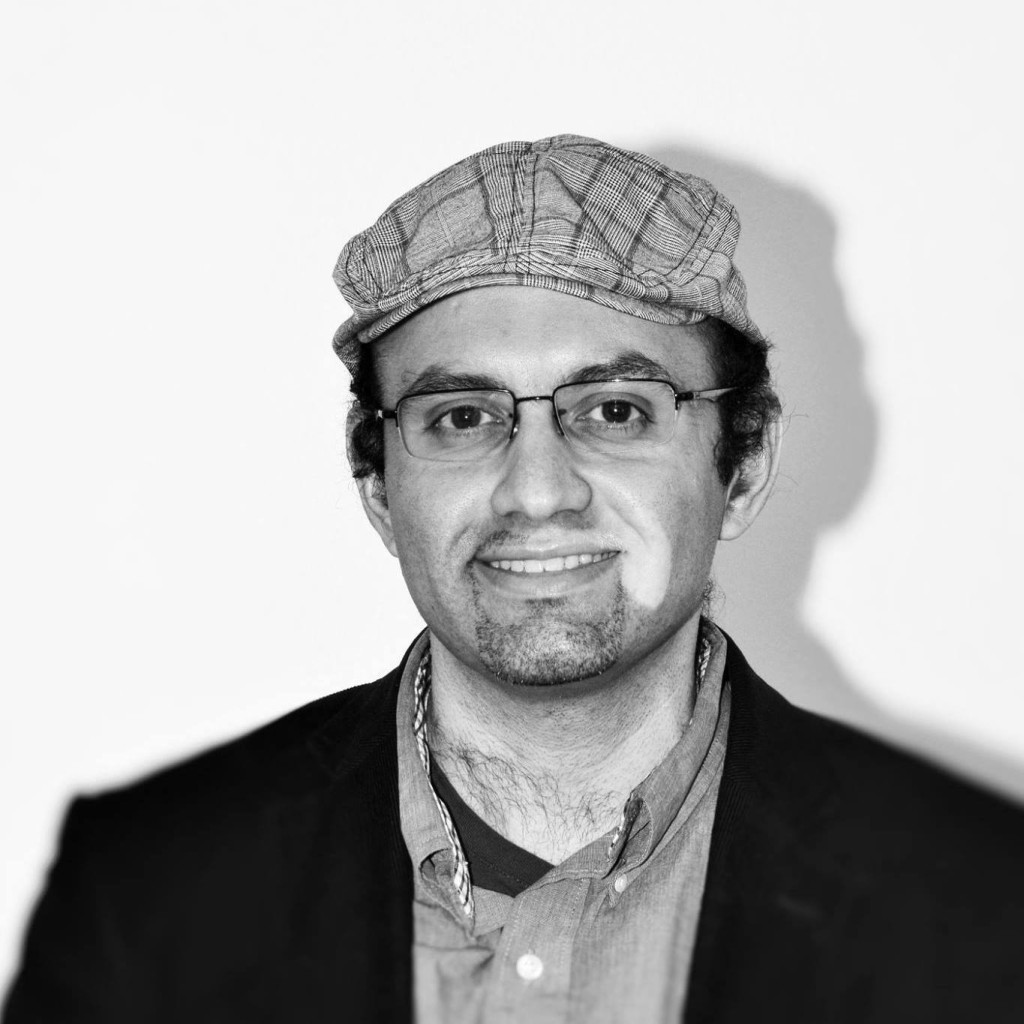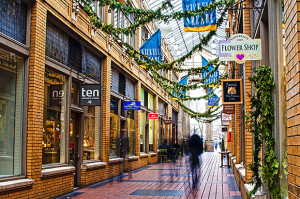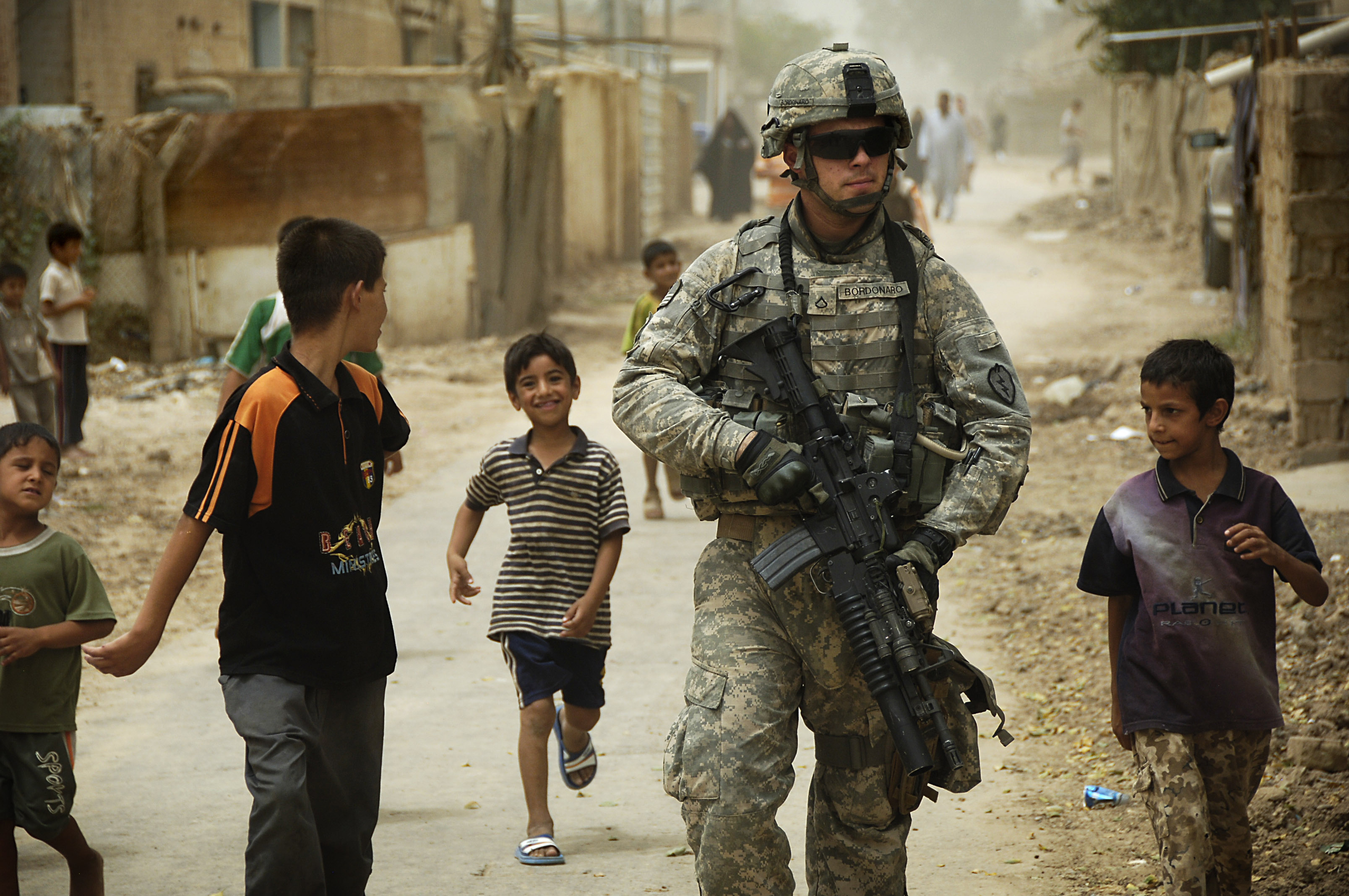As a 6-year-old child living in Baghdad, my life was turned upside down in 1991 when the first Gulf War ‘engulfed’ Iraq. I still remember going to sleep on that fateful night very proud, like the rest of Iraqis, with our invasion of Kuwait and, as we were informed by the news media at the time, the taking of what was rightfully ours.
The distressing secrets that were kept from us, of course, regarding the causalities and oppression against the Kuwaiti people that took place during this supposed ‘liberation’ of the 19th county of Iraq manifested itself in a frightening show of power on the early hours of the morning of January 17th, 1991. Rushing from my bed with the rest of my family downstairs to the bomb shelter in my apartment building as the glass windows shattered on our faces was a quick introduction to the complexities of life; that reality is not always as it seems, what we deem good might very well be evil and innocent lives are always caught in the middle.

I’m anything but regretful about that fateful event; for it has transformed me into what I am today. I also think of it as a dense foreshadowing into what would constitute my identity in the future as an Iraqi-born American. I had heard, along the years, numerous ideas and theories as to what happened in the first Gulf War. Whose fault was it that the Iraqi people should suffer the way they did and the country go from one of the richest to the poorest in the region? Often times, these explanations dealt in absolutes and put the blame on the ‘Other’; whoever that may be.
The years passed me by and in 1998 I would leave the Middle East behind and migrate with my family to another shelter and safe haven, the United States. This might sound outlandish for some, but a poetic memory appears in my mind every now and then. Through divine grace, the American warplanes that had caused me and my family to rush from our apartment to the bomb shelter were like the reaching arms of a mother that forced its child to rush to its bosom: “your home is in America, this is how the divine is manifesting Himself to you now… you will understand this later!”
This becomes clearer considering that it is in America that I find my religious self, not during the first 13 years of my life that I spent in the Middle East. It was in this non-Arabic speaking and majority non-Muslim country that I found God; that divine essence that is not limited by a place or time, but whose Sacrality and manifestations envelop all places and times. He always manifests Himself in new forms and images that are unique to every culture and society.
I had struggled during the first decade of my new life to understand these new mysterious ways of God in America. What does He want from me? What is my purpose in this country? Am I supposed to regard it as a foreign yet safe and resourceful place where I can establish a ‘safe space’ in order to be a Muslim away from an – apparently – godless society? or am I supposed to delegate being Muslim as a far and distant concept that is incompatible with America and that my new allegiances dictate that I dress myself in a new garb of, pretended, assimilation?
I must be frank. During this decade of exploration, I had fluctuated between these two solutions and absolutes that are easy to utter and believe in but tremendously contentious and precarious to live, experience and validate. I had also simultaneously noticed my religious community steer away from the political right towards the left in an attempt to find their own niche in an ideology that ‘tolerates’ and validates them. It was merely a few years, prior to the savage attack of September 11th, that Muslims in America used to consistently lean right politically. However, now it seemed that the situation had changed, and Muslims needed to look out for Muslims in America.
If the first Gulf War had taught me never to deal in social absolutes, as the Sith would, my immersion in Islamic mysticism and philosophy in 2012, as part of my graduate studies, elevated and heightened this realization to its spiritual and cosmic dimensions. Ibn al-‘Arabi (d. 1238), the famous Andalusian mystic, famously said:
Reality is perplexity, perplexity is anxiety and movement and movement is life.
I perceived my entire life in that statement when I first came across it. Ibn al-‘Arabi single handedly taught me to appreciate the journey of appreciating the unique sacredness of America. Like the rest of my religious community, I voted democrat in the elections of 2008 and 2012. I dressed my motivation in the slogan that “we need to save America from the Republican party”, but in reality we Muslims all knew that the real slogan is: “we need to save Muslims in America from the Republican party”. My experience of absolute explanations and theories, however, taught me to always await the unknown and unpredictable; there is always a chance that something is amiss.
Over the years, I noticed that the political right had been deserted by Muslims and thus had to resort to its own, often times – but not always – misinformed, voices about who Muslims and Islam are. More importantly, I noticed an incursion upon the principles and values of the Muslim community in America. A certain agenda that marches in the name of social justice but does so while presenting man as a speck in the universe with no divine care or providence; one where he must utilize any means necessary to achieve his liberty from the oppressor.
This paradigm also insinuated that the Muslim subject in America will always be subject to Othering; will never be accepted, loved or cherished by the predominant discourse, the oppressors and their power structure. Instead, the Muslim subject must align himself, in this narrative of absolutes, with the groups that are always of the downtrodden and oppressed. The only way this narrative of absolutes could make sense for an immigrant Muslim population is if its presented in the ethnic language of race: “Leave the whites behind, they will never accept you. Instead, join the minorities.. join the Black and Native American struggle; for they, and only they, will accept you for who you are.”
At the most basic level, I was always struck by the fact that this narrative of absolutes is not only non-Prophetic, it is actually anti-Prophetic, anti-Muhammadan. During his one and only pilgrimage in Mecca, the Prophet of mercy, Muhammad, may peace be upon him, said:
There is no superiority for an Arab over a foreigner nor for a foreigner over an Arab except through piety.
Anybody who knows the history of Arabia prior to the advent of Islam will understand the power of this declaration: “There is no superiority for the powerful over the downtrodden, nor for the downtrodden over the powerful, except through piety.” For the Arabs were wealthy and powerful merchants and slave holders as well. They enslaved foreigners for many decades by using usury and other underhanded means.
The Prophet Muhammad had also come to universalize this sacred message of salvation, liberty and freedom by instructing his followers at other times to: “Aid your brother, whether he’s the oppressor or oppressed.” They asked: “Oh messenger of God, we know how to aid him if he is the oppressed, what about if he is the oppressor?” The Prophet said: “Aid him in stopping his oppression.” It became clear to me through my reading of the Prophet Muhammad’s life and how it manifested itself in the thought and works of mystics like Ibn al-‘Arabi that liberation, freedom and justice is not achieved through boycotts, divestments, or petitions, but rather the opposite: a direct engagement and show of compassion to all; especially those who oppose us, especially the oppressors.
Most importantly, it seems to me that the Prophetic message is precisely anti-absolutist. It would not manifest itself today as anti-white or anti-black or anti any race of ethnicity. He would certainly also not label injustice with an ethnic label, such as ‘white privilege’, even though he would agree that African Americans and other native minorities do face oppression and injustice in this country; stories that goes back many centuries and which indeed need to be harmonized and rectified. However, he would most certainly be saddened by his followers who thought they could rectify this painful history by aligning themselves with an oppressed against an oppressor that have now been unequivocally identified with everyone who is black and white, respectively. He would ask: “Why did you not heed my instruction to aid your brother whether he is the oppressor or oppressed? In whatever color, shape, or form he might come?”

I became a Libertarian with this massive background in mind. I did not do so because I seek acceptance in a particular group or affiliation, but rather, as far as I can tell right now, because I genuinely feel this is the divine imperative for me. Still, it is worthwhile mentioning that in the short period since I have joined the Libertarian party and the Young Americans for Liberty organization at the University of Michigan, I have been met with nothing but love and affection from all; something which I cherish and am truly grateful for.
I must also admit that this political and social affiliation has actually, somewhat, rejuvenated me spiritually. It is perhaps best explained as a certain harmony between belief and conviction, on the one hand, and act or activism on the other. From the distress and suffering of people of all ethnicities and races here in America to innocent civilians suffering in Israel/Palestine, Syria, Iraq, Burma and every single creation of God who still suffers through an oppression from another creation of God; Muhammad, America and Ibn al-‘Arabi have taught me to bring out the best in both, the oppressed and oppressor so that they each manifest that God given sacredness and divine trace inherent to both of them, which no one can take.
The famous French philosopher and father of Deconstruction, Jacques Derrida, states in Of Hospitality that the modern immigrant only finds his identity at a place of death, not birth, because it is only at the place of death that there is stasis, tranquility and an opportunity for reflection. I address this to America, “Mother, I may not be one of your sons who’s carrying a rifle and who swore to defend you with his blood… but I will defend you and what you stand for with the ink of my pen and last drop of sweat. You have my undying and unbounded love. I hope to find my true and final identity by breathing my last on your blessed soil and to be enveloped, for one last time, by your loving arms”.
